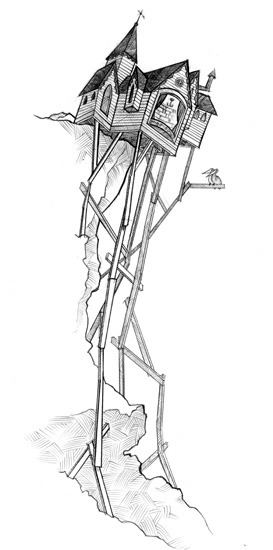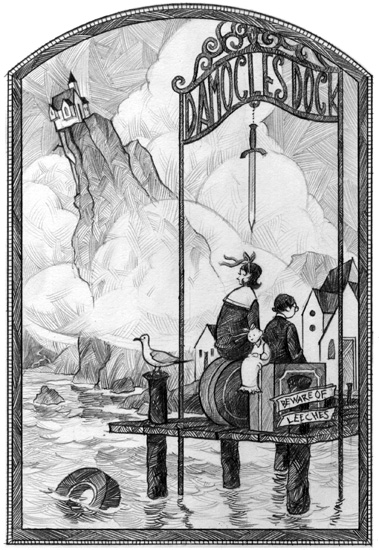Reader Series: 'The Wide Window,' Lemony Snicket
This is the third post in a series leading up to the premiere of Netflix's 'A Series of Unfortunate Events' on January 13, 2017. The series will cover each of the 13 books and 'Lemony Snicket: The Unauthorized Autobiography.' Be warned: there are spoilers ahead.
Again, the Baudelaires must relocate to the home of a new guardian, an Aunt Josephine. Aunt Josephine is in love with grammar and afraid of everything else, perhaps proving the mind-altering theory of solitary confinement. Her husband, Ike, was eaten by leeches in the lake, which is overlooked by Aunt Josephine's house literally on a cliff. Count Olaf pursues the Baudelaires yet again and the siblings display their incredible sense of ingenuity in the face of adults' willing ignorance.
The Wide Window discusses themes and motifs like irrational fear, trauma, allergies, bad disguises, code-breaking, and how you shouldn't eat before traveling on a lake filled with leeches. Snicket suggests that Josephine's isolation created her intense fear of everything; you would think that such an extreme kind of paranoia wouldn't lend itself to such a willing naivete when Count Olaf shows up as Captain Sham. Many, many, many of the adults in the series are all too willing to believe Olaf's disguises, which Snicket himself describes as "transparent." This is a source of frustration for the reader through most of the series, allowing all of us to share some part of the Baudelaires frustrations.
We as readers have already glimpsed the lengths to which Count Olaf is willing to go, with this book taking it even further, but The Wide Window focuses several scenes on the abilities of the siblings and the lengths to which they are prepared to go for their survival and, hopefully, the survival of others who are kind to them. This book proves the Baudelaires can be formidable opponents for the forces of evil pursuing them.
Scenes showcasing the Baudelaires maturity, levelheadedness, and serious cleverness, constantly reassure me. I support any story that shines a light on the self-sufficiency children are capable of, rather than coddling them as many children's books tend to do. The series may be unusually unfortunate but they reveal many hard truths about the human race and, especially, the adults within it.
Again, the Baudelaires must relocate to the home of a new guardian, an Aunt Josephine. Aunt Josephine is in love with grammar and afraid of everything else, perhaps proving the mind-altering theory of solitary confinement. Her husband, Ike, was eaten by leeches in the lake, which is overlooked by Aunt Josephine's house literally on a cliff. Count Olaf pursues the Baudelaires yet again and the siblings display their incredible sense of ingenuity in the face of adults' willing ignorance.
The Wide Window discusses themes and motifs like irrational fear, trauma, allergies, bad disguises, code-breaking, and how you shouldn't eat before traveling on a lake filled with leeches. Snicket suggests that Josephine's isolation created her intense fear of everything; you would think that such an extreme kind of paranoia wouldn't lend itself to such a willing naivete when Count Olaf shows up as Captain Sham. Many, many, many of the adults in the series are all too willing to believe Olaf's disguises, which Snicket himself describes as "transparent." This is a source of frustration for the reader through most of the series, allowing all of us to share some part of the Baudelaires frustrations.
We as readers have already glimpsed the lengths to which Count Olaf is willing to go, with this book taking it even further, but The Wide Window focuses several scenes on the abilities of the siblings and the lengths to which they are prepared to go for their survival and, hopefully, the survival of others who are kind to them. This book proves the Baudelaires can be formidable opponents for the forces of evil pursuing them.
If you are allergic to a thing, it is best not to put that thing in your mouth, particularly if the thing is cats.
Just because something is typed-whether it is typed on a business card or typed in a newspaper or book-this does not mean that it is true.
It dawned on them that unlike Aunt Josephine, who had lived up in that house, sad and alone, the three children had one another for comfort and support over the course of their miserable lives. And while this did not make them feel entirely safe, or entirely happy, it made them feel appreciative.
It is very easy to say that the important thing is to try your best, but if you are in real trouble the most important thing is not trying your best, but getting to safety.
The good people who are publishing this book have a concern that they have expressed to me. The concern is that readers like yourself will read my history of the Baudelaire orphans and attempt to imitate some of the things they do. So at this point in the story, in order to mollify the publishers - the word 'mollify' here means 'get them to stop tearing their hair out in worry' - please allow me to give you a piece of advice, even though I don't know anything about you. The piece of advice is as follows: If you ever need to get to Curdled Cave in a hurry, do not, under any circumstances, steal a boat and attempt to sail across Lake Lachrymose during a hurricane, because it is very dangerous and the chance of your survival are practically zero.
Mr. Poe was kindhearted, but it is not enough in this world to be kindhearted, particularly if you are responsible for keeping children out of danger.
Scenes showcasing the Baudelaires maturity, levelheadedness, and serious cleverness, constantly reassure me. I support any story that shines a light on the self-sufficiency children are capable of, rather than coddling them as many children's books tend to do. The series may be unusually unfortunate but they reveal many hard truths about the human race and, especially, the adults within it.



Comments
Post a Comment